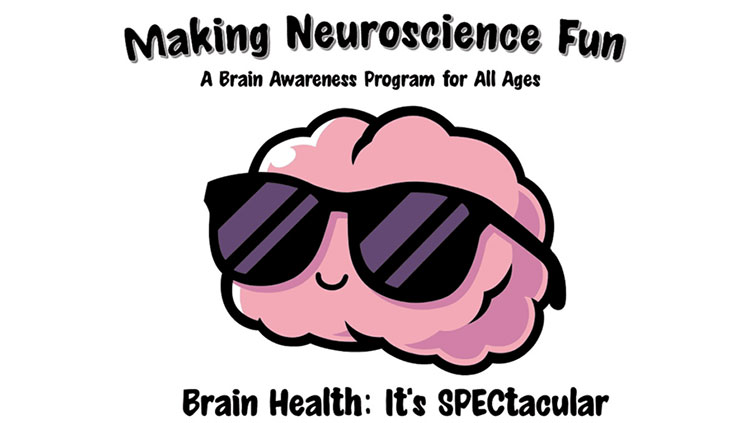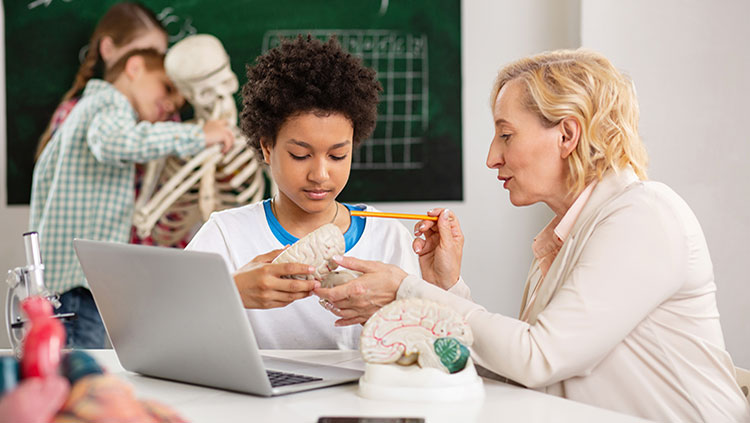Brain Health: It’s SPECtacular (Ep. 5) — Why Emotional Health Matters for a Growing Brain
- Published24 Jul 2025
- Source BrainFacts/SfN
Why is emotional health essential to brain development, and what happens when kids aren’t taught how to recognize or manage their feelings?
In this video, Linda Gorman, neuroscientist and Founder of Making Neuroscience Fun, LLC, explores the neuroscience behind emotional behaviors and how they shape our ability to cope, connect, and thrive. Covering everything from emotional regulation and empathy to brain plasticity and hormonal changes, this talk dives into why helping kids build emotional intelligence is just as important as teaching them math or reading.
Part of the “Brain Health: It’s SPECtacular” program, this video offers educators and caregivers insight into how emotional development supports lifelong brain health — and what simple, science-backed steps can help young learners grow.
Check out other videos in the six-part video series:
- Episode 1: Teaching Social, Physical, Emotional, and Cognitive (SPEC) Skills
- Episode 2: How Social Health Builds the Brain
- Episode 3: How Physical Activity, Sleep, and Nutrition Impact Brain Development
- Episode 4: Attention, Learning, and Memory Shape Growing Minds
- Episode 6: Teaching Brain Health in Schools and Communities
Explore Making Neuroscience Fun — Brain Health: It’s SPECtacular from Johns Hopkins
CONTENT PROVIDED BY
BrainFacts/SfN
Transcript
Dr. Linda Gorman:
Why do we need — that's the "E" in SPECTacular — why do we need our emotional health? Well, this is one of my favorites, and this is the one — the aspect of our brain health — that really got me thinking about creating this program. Because I had all of these neuroscience students who were smart, who I was teaching brain stuff to, I knew that they were learning a lot, but they still — they did not know how to control their emotions. They did not know how to control their emotional behaviors. So, this is really what got me started.
So again, emotional behaviors — your emotional health — is going to affect how you deal with changes in the environment, what kind of coping mechanisms you do, and whether or not you do those coping mechanisms or you're like, "I don't really care about that," because you're not feeling that well.
So, it involves our emotions. Now, we know there are positive and negative emotions. We know that these emotions are going to alter perceptions of information that's coming in. We know that it's going to alter our motivations. We know that your emotions change over time. But the thing about emotions is that not only do they change over time, they change constantly. Your emotions from one minute to the next can be something different.
So again — and a lot of you already know a lot about this because of the socio-emotional information that's out there — but basically, your emotional behaviors allow you to recognize what emotion you're undergoing, to regulate that emotion, to understand that your emotional state is going to change how you behave. Again, because we live in this social world, we have to understand when it's okay to express our emotions and when it's okay to not express our emotions — and then to develop skills to deal with those emotions. So, all of that falls under the auspice of emotional intelligence.
So basically — and again, if we look at the brain — the areas of the brain that control our emotions. Well, one of the things that I always find interesting is that the development of emotions — by eight or nine months, your basic emotions are already developed. That's because the parts of the brain that are controlling those behaviors are already developed at birth and through that first year of life. But then there's a whole other part of the brain — aspects of emotional health — which are changing. These are called the limbic areas. And there's lots of different parts of the limbic system. These are areas that are extremely high in neuroplasticity throughout your entire lifespan.
So again, looking at the development of emotions — basically, three to five, that's your pre-K area — you're starting to develop social rules, appropriate expressions. Six to eight, you're starting to — that's where the theory of mind — so understanding that other people have different ways of thinking and seeing the world. Friendships are starting to be important. Nine and eleven, you're starting to understand all the different social aspects of emotional behaviors and when it's okay to express those emotional behaviors. And then twelve to eighteen — all heck breaks loose — because the hormones are going to play a role and are involved.
So, the emotional behaviors — again, you'll see the development of the emotional behaviors. When someone can't control their emotional behaviors, it may be because that area of the brain is not developed yet — so that they can't control their emotional behaviors.
So emotional behaviors — we know those areas of the brain are high in plasticity. We know that positive emotional behaviors tend to increase our social behaviors, cognitive behaviors, physical behaviors. We've already seen that those are very good for our brain health. And of course, it's going to decrease the inflammation and oxidative stress. Now, those are when positive emotions are there. When it's negative, those areas change directions.
So how can we improve our emotional health? Learn how to label your emotions. It's okay to be sa d —being sad is just part of life. But being sad all the time is not. So, you need to be able to see, "Am I sad because of something, or am I sad because something's going on in my brain?"
Show empathy. This is one of the things that — part of the reason why I developed the “Making Neuroscience Fun” program — was that when you go out and deal with other people and show empathy toward those other people, that makes you feel good too. I call it selfish altruism.
You're doing something good for somebody else, but it's also helping your brain express the appropriate emotional behaviors.
Develop problem-solving skills. So, one of the things that we have to do is we have to realize — again, we're in this social environment — how do we deal with these emotions that we have? You can't control your emotions. Most of the emotions are just expressed because of your sympathetic and parasympathetic nervous system. But you can control your emotional behaviors — how you respond to those behaviors.
Come up with good coping mechanisms. And remember, you can't always control your emotions. Those happen, and they change all the time. But you can control how you express those emotions, what behaviors you then produce for those emotional behaviors. And that's going to help your brain.
So again, emotional behaviors — very important for a healthy brain, as are social health, physical health, and cognitive health.
And that brings me to my favorite part of the SPECT health.
Also In Teaching Techniques
Trending
Popular articles on BrainFacts.org













